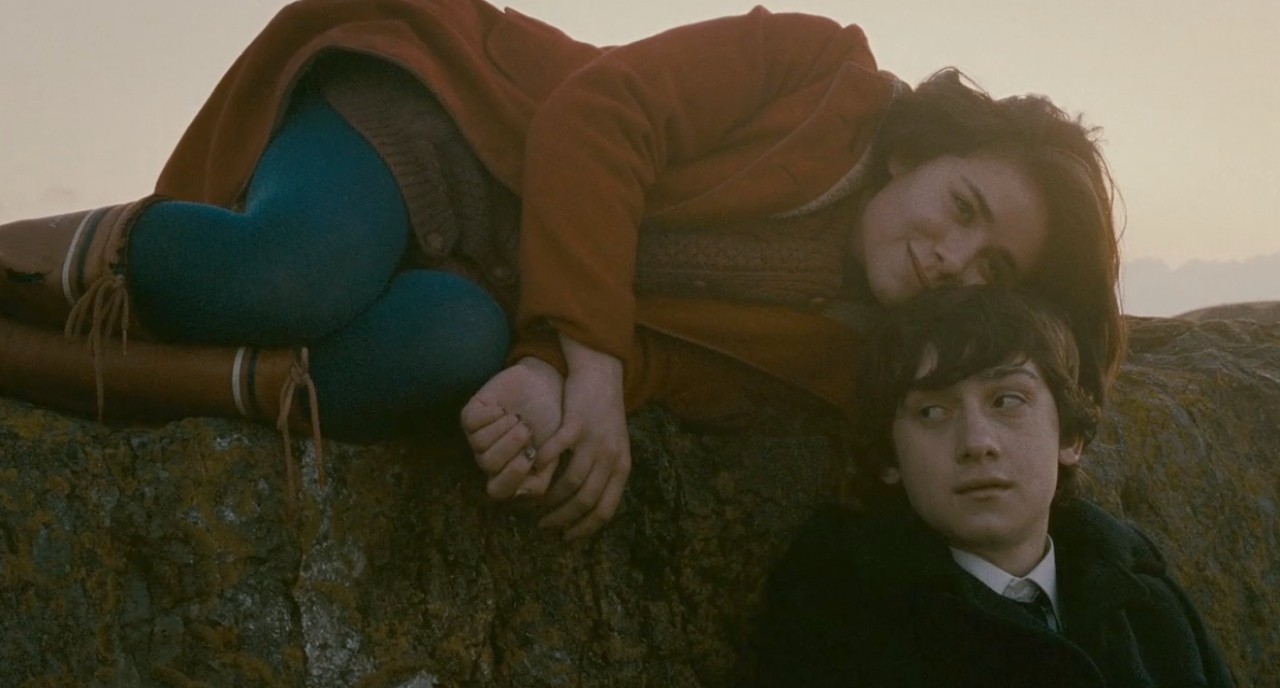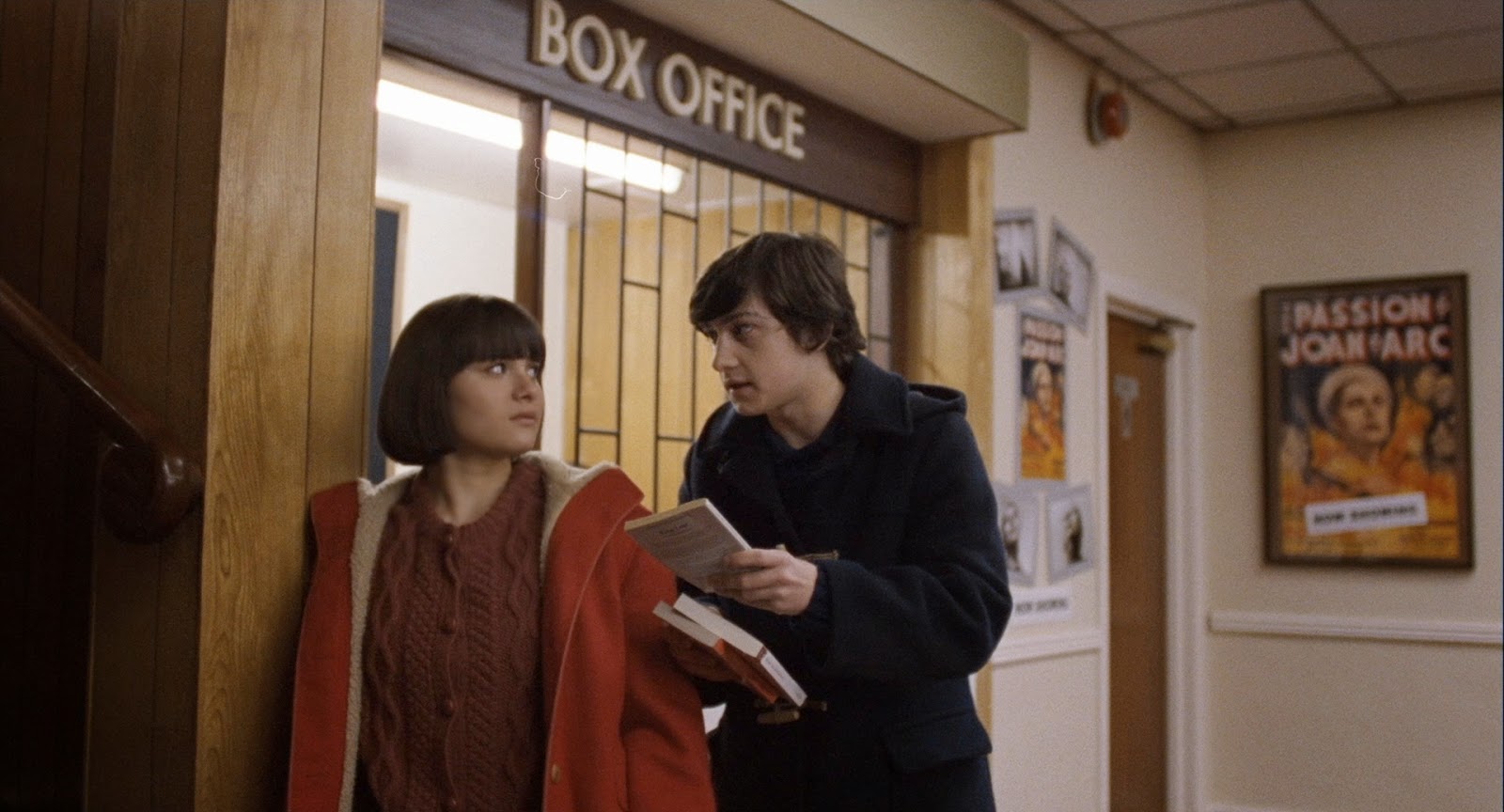
A teenage boy walks through a sterile hallway, a bouquet of flowers clutched in his hand. A girl looks up at him. “You should go in,” she declares. So the boy walks across a long, metal bridge toward a woman who lies asleep, looking half dead.
You wouldn’t be alone if you assumed that extravagant, surreal scene was ripped from a mournful epic directed by Darren Aronofsky or Terrence Malick. Yet it comes from a more compact source: “Submarine,” Richard Ayoade’s 2011 adaptation of Joe Dunthorne’s novel of the same name.
Ayoade’s “Submarine” is about small things that feel emotionally big. Its protagonist, Oliver Tate (Craig Roberts) is a kid who has a home near the Welsh coast, a creepy-but-cute girlfriend named Jordana (Yasmin Paige), and plenty of time to stare meaningfully at the ocean. Yet his seemingly idyllic life is on the verge of deflation—not only because his bond with Jordana begins to sour, but because his father, Lloyd (Noah Taylor), is clinically depressed and his mother, Jill (Sally Hawkins), has her eye on Graham Purvis (a deliciously smarmy Paddy Considine), the pompous mystic next door.
Are Oliver’s troubles serious, or just vestiges of his privileged upbringing? A little of both, Ayoade hints. His script is filled with melodramatic lines that leave Oliver exposed to our mockery (Oliver says that his dunderheaded pal Chips, played by Darren Evans, reminds him of “the brave men who died in the first World War”), but it also has plenty of grandiose moments, like that scene on the bridge—scenes that take Oliver’s youthful (but no less profound) fears of death and loneliness seriously (the title is an odd but apt reference to Oliver’s sense of alienation).
That merging of mockery and empathy that makes “Submarine” one of the rare sterling romantic comedies to emerge from the current decade (the others are “Scott Pilgrim vs. the World” and “Scott Pilgrim vs. the World”). But it’s so much more than that. It’s a ballad of a father and a son, an ode to first love, a beautifully retro fantasia (the film is set in a vaguely defined past where Oliver listens to a cassette tape and “Crocodile Dundee” plays at a local movie theater), and above all, a story of a boy who tries to be a better man than he thinks he is.
Those are just a few of the reasons why “Submarine” has now endured in the annals of romantic cinema. Here are six more.
1. It’s perfectly cast

Like brand-name stars dropping in to play Stormtroopers in a “Star Wars” movie, the four lead actors of “Submarine” popped up in “The Double,” Ayoade’s (even better) second feature. Their cameos were a surprise treat, but they also crystalized Ayoade’s nostalgic streak. Clearly, he wasn’t ready to let go of the performers who anchored his feature debut just yet, and who can blame him? In Roberts, Paige, Hawkins, and Taylor, Ayoade found four actors with the comic timing of Chaplin in “Modern Times” and the fearless vulnerability of Chaplin in “City Lights.”
That’s certainly true of Roberts, who narrates the film and has no trouble leaning into Oliver’s penchant for overstatement. While hosting Jordana at his parents’ house for a night of sex and dessert, he declares, “To us—and a wonderful evening of lovemaking.” The line could have been creepy, but Roberts make sure we hear the desperation beneath the “romantic” bravado—the sound of a kid who is determined to look suave, but doesn’t have a clue.
You hear it again during Oliver’s blundering attempts to repair his parents’ marriage (“Me and dad have discussed it, we both want to make this marriage work,” he announces to his mother in a lordly fashion. “Are you with us?”) and while it’s hilarious, it also makes it more poignant when Oliver’s kiddish gusto is stripped away in the third act.
That stripping is spurred largely by Oliver’s relationships with the main women in his life: his mother and Jordana. Paige and Hawkins fill those roles effortlessly (they skillfully play into the insecurity and irritation that Oliver arouses in both women). Yet it’s Taylor who emerges as the film’s supporting standout. If you’ve witnessed the nauseating sight of him chopping off Jaime Lannister’s hand as if it were a limb of an oak tree, so much the better; it’ll make Lloyd’s psychological impotence all the more tragic.
Lloyd’s depression shows in his features. His hair looks overgrown, his body looks frail, and he has the vacant gaze of a man who missed his breakfast for a week. He’s such a sad sack that he’s funny, but Taylor makes sure we don’t miss the seriousness of Lloyd’s illness. When Jill asks Lloyd for his opinion on her hair while the family watches television in the living room, Lloyd stiffens painfully; he’s so drained that the prospect of expressing even a barely significant opinion terrifies him.
Thus, we have two romances unfolding at once: one between Oliver and Jordana that brims with possibility, one between Lloyd and Jill that seems to be wheezing to a close. It’s because the actors play each moment so sincerely that you care about the fate of each relationship, making it seem as if these people were your friends, family, or just someone you spotted while peering into that living room, where nothing and everything is at stake.
2. Ayoade masterfully uses subjective storytelling

In 2010, a wave of rigorously ambitious films—Christopher Nolan’s “Inception,” Edgar Wright’s “Scott Pilgrim vs. the World,” and Darren Aronofsky’s “Black Swan”—attempted to envision mental space as visual space. The camera may never lie, but what if, those directors asked, it captured events not as they actually happened, but as they were seen through the eyes of damaged, delusional characters?
It wasn’t exactly a fresh idea, but the three directors injected it with fresh creative blood—thereby paving the way for Ayoade to fill “Submarine” with strange, deeply subjective images that alert us that we not watching an objective portrait of Oliver’s life: we’re watching an objective portrait of what Oliver’s life feels like to him.
Our first clue arrives when Oliver confesses that he wishes a film crew would follow his “every move,” adding that at this particular moment, he’d like to the see the camera “craning up.” Yet he concedes that “unless things improve, the biopic of my life will probably only have the budget for a zoom-out.” Sure enough, the camera zooms out in that very scene, leaving us with the impression that Oliver is, in a sense, directing “Submarine” (an opening message in which Oliver himself encourages American viewers to watch the film “with respect” suggests as much).
By that account, we must allow Oliver to be the canniest editor since “Citizen Kane”-era Robert Wise. Mysteriously, the film skips over moments that might cause Oliver undue embarrassment, including when he loses his virginity and when he takes a pummeling from a bully before a crowd of his schoolmates. The result is a movie that is fueled by the fascinating friction between Oliver (who wants to appear noble and crafty) and Ayoade (who wants to rip away Oliver’s posturing to reveal the self-doubt beneath).
Luckily for us, Ayoade turns out to be more than a match for his protagonist. He understands that while fantasies may reveal desires, they also reveal weaknesses—plenty of which figure into an early scene where Oliver imagines how people would react if he died. It’s a lurid fantasy of self-love (concluding with Oliver dressed in an Obi-Wan-style robe, signaling his “glorious resurrection”), but it also reveals his greatest weakness: he feels so alienated from his parents that the only way he can imagine securing their attention and affection is by vanishing.
In that moment lies the secret of Ayoade’s brilliance: He allows Oliver to color the movie and gets under his skin at the same time.
3. It offers a complex perspective on masculinity

The patriarchy, what is it good for? Even less than you’d think, according to an incisive 2011 article by New York Times film critics Manohla Dargis and A.O. Scott, which tallied up the various archetypal clichés that men in modern movies slide into (the categories were “the big baby,” “the brave boy,” “the bachelor,” “the husband,” “the hero,” and “the wimp”). “The movies may be male dominated,” they wrote, “but the images of men are surprisingly narrow.”
That remains true in 2017 (although Ryan Gosling wrote a fascinatingly complicated chapter in the history of cinematic masculinity in Terrence Malick’s “Song to Song,” in which he wielded a gun and wore a women’s leopard-print shirt). But in 2011, “Submarine” offered an unusually nuanced potrait of what it means to be male with its portrayals of both Oliver and Lloyd.
Oliver is not manly in the traditional sense of the word. He doesn’t play sports and he isn’t physically imposing, but he tries to achieve some kind of masculine dominance through aggressive pretentiousness (he obnoxiously badgers Jordana to read a stack of books that includes “The Catcher in the Rye”). But that facade dissolves when we learn that Jordana’s mother has cancer—a revelation that causes Oliver to shrivel and shirk his boyfriendly duties.
If anything, Lloyd is more cowed. Though he attempts to pump Oliver up with some tough-guy rhetoric (“You go get ’em, killer”), his depression makes it difficult for him to mold himself into the willfull partner that Jill desires. Certainly, Lloyd compares unfavorably to Graham, who gamely flatters Jill (Lloyd rather pathetically recalls that he once wooed a woman by ripping off his vest).
These frailties are striking in a filmic age defined by the steroid-boosted biceps of Marvel and DC superheroes. And remarkably, Ayoade refuses to insinuate that Oliver and Lloyd should solve their problems by simply manning up. In the end, the important thing is not that they embody some outmoded view of what it means to be masculine, but that they live with honor and compassion—which, for Oliver, turns out to be easier said than done.